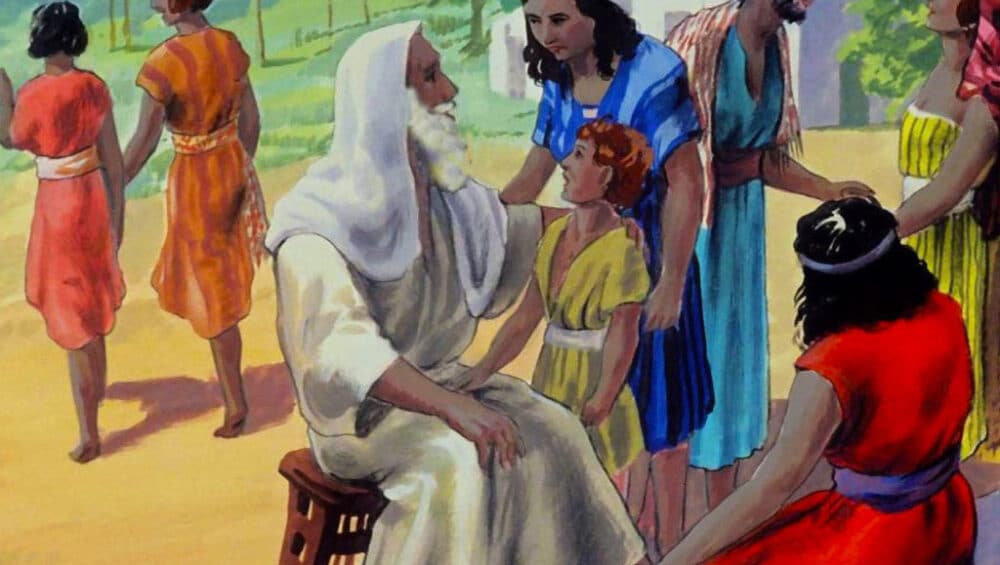Glory Story / FreeBibleimages.org
Welcome to Livin’ Light’s Bible-In-A-Year challenge of discovering God’s love for us and His purpose for our lives. Here is the format for this great adventure: The daily reading assignment is posted at 5 a.m. After each day’s reading, Leigh An Coplin, the blog host, shares observations and poses questions about difficult passages to Rob Fields, who studied Christian Education at Asbury Seminary and currently teaches Biology in the Orlando area. To start from the beginning, click on 365 Bible Readings and scroll down to Day 1. The reading schedule is taken from The One Year Chronological Bible NLT.
Today’s Reading
— Job 40:6-42:17
(Before 2100 BC) Click here for a timeline of the whole Bible.
Questions & Observations
Q. (Job 40:6-41:34): God details and describes a beast that is unstoppable, impenetrable. God gives this beast as an example that, no matter what Job says and accuses Him of, he cannot hurt God. God is invincible.
A. God is invincible, but I think what He’s saying is that Job knows nothing of power. Only God is powerful enough to see these incredible beings (whatever they are, there’s a number of theories about that) and just consider them “part of Creation.”
O. (42:1-6): Job has finally had his day in court, as he wished. Now, he has his answer and is humbled. He repents! So, after all of this back-and-forth between Job and his friends, we realize that we are not all-knowing like God and thus, have no authority to question Him. After reading all of this, I finally understand that, although it is still extremely hard not to question God!!!!
Q. (42:7-9): Here, God addresses Job’s three friends saying that they misspoke of Him. Job spoke correctly. They spoke for God, as if they knew what God wanted them to say.
This does bring up something that we have not spoken of. If you see a friend sinning, is it our responsibility to correct them? Or, do we just pray? I used to think that I didn’t have the courage to speak up. Now, sometimes I do have the courage and speak up. Sometimes it goes OK or there is not a comeback, other times I wish I had kept my mouth shut. As disciples of God, what is our duty when it comes to wanting to steer someone right? Clearly, from Job, we would have to know the whole story.
A. We will never know another person’s whole story or walk with God, so we must be very careful about stepping into their lives to try and convict them of sin. We must be discerning on when is the time to speak, and the time to be silent. Having said that, I believe that God desires for us to be our “brother’s keeper” as it were (something old Cain was terrible at), and if we truly care about them, we should be in prayer for what is best for them and asking the Spirit for the right time to ask or speak up about what we see or think we see.
Q. (42:13-15): Here is one of the things I struggle with. Churches vary on if men are dominant over women. The Bible seems to hint that men were more important than women in those days by showing most of the ancestry lines of men. This bothers me because I don’t want to think that God made me any less important than a man. I am trying to change my way of thinking — thanks to Rob — that it’s not always the Bible’s words, it’s the message. And, 43:14 gives me peace. Here, God says that he made Job’s daughters lovely. And that Job put them in his will along with his sons. Now that Job is truly a man of God, he treats all of his “flock” with love. In Genesis, when Sarah waited in the tent while Abraham greeted his guests, which was customary of the times. Even though she was not visible, God addressed Sarah about having the baby. God even asked Abraham where she was. So, God is telling Abraham that He is addressing Sarah too. She is a part of God’s plan. This shows that God does not give importance to male or female, firstborn or youngest — all of His people have important roles. I should not be concerned with the argument regarding men being more important than women, rather than what work does God have for me? Just like Job was asking God, why are you not punishing the wicked? Why are you persecuting me? Job should have said, “What can I do for You?” Rob, any comment?
A. Regardless of its inspiration, I believe that the Bible does seem to focus in on men rather than women as a general rule (the rule of life then when women generally had no rights). But, this does not mean that God desires any less for women than He desires for men: Woman was created in the image of God just as much as man was, even if she didn’t have all the benefits or status in ancient society. I am glad to hear that you feel there is a place for women in the tale of Scripture, and believe that we will see this trend continue in the first two chapter of Exodus. Watch the way that women (including Moses’ mother) will defy Pharaoh in order to follow God.
And that’s all for Job! All that repetition and trudging paid off. Job answered a lot of my “life’s questions.” How about you?
For further study
— Check out this video about just who do you think you are? https://www.youtube.com/watch?v=3Oz1G0opCiA
— This Bible Project video summarizes the Wisdom books of the bible — Proverbs, Eccclesiastes and Job https://www.youtube.com/watch?v=GswSg2ohqmA
Shop: Remembering just who God is helps you get through the hard times. Remember, with God, your cup is overflowing! https://livinlight.org/product/overflow-t-shirt-2/
Tomorrow’s reading: Exodus 1-2















